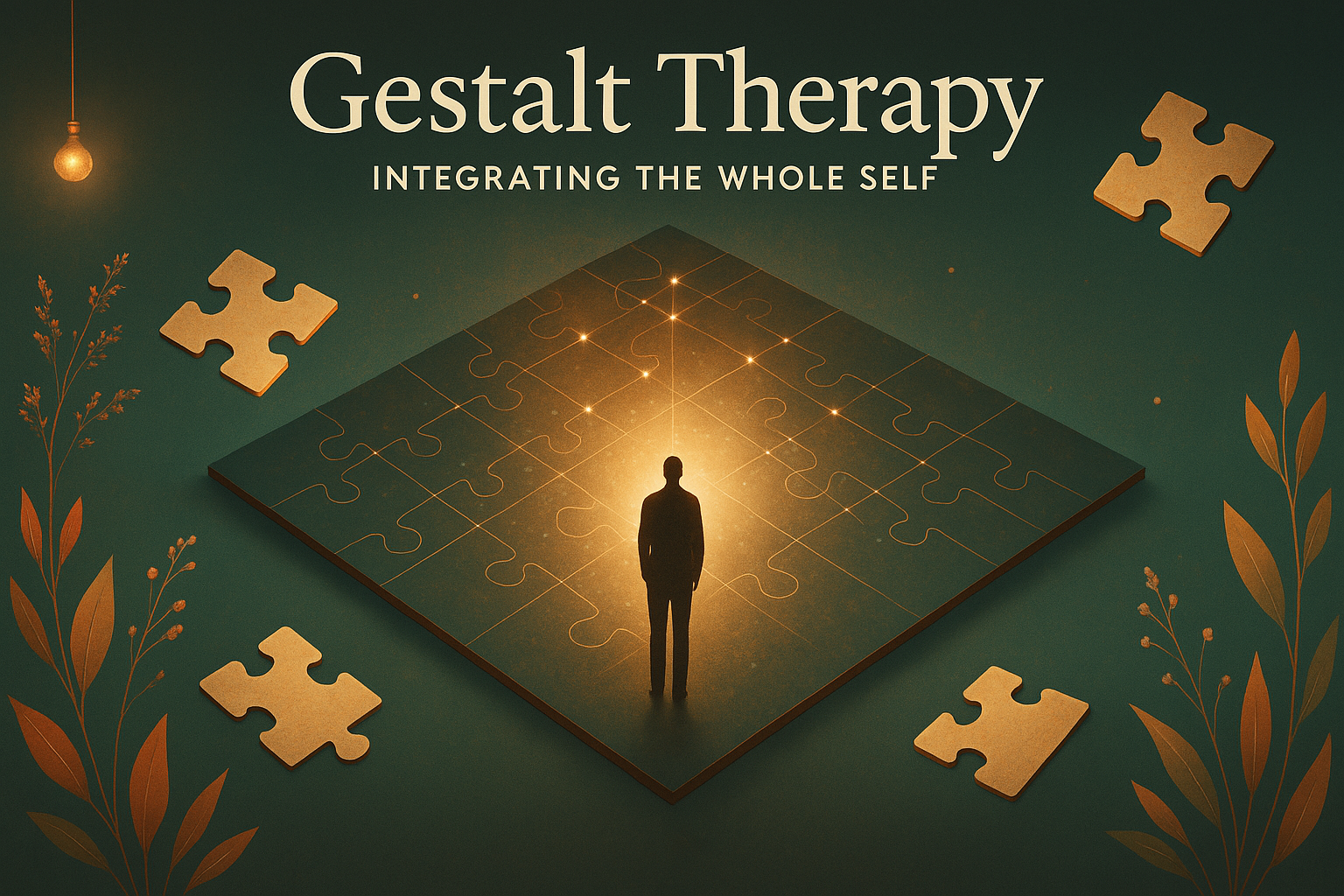Embracing Wholeness and Living in the Present
Gestalt therapy is a humanistic and experiential approach to psychotherapy that focuses on helping individuals gain awareness of their thoughts, feelings, and actions in the present moment. Developed in the 1940s and 1950s by Fritz Perls, Laura Perls, and Paul Goodman, Gestalt therapy encourages clients to explore their experiences holistically, addressing the mind, body, and emotions as interconnected parts of the self. By fostering self-awareness and personal responsibility, Gestalt therapy empowers individuals to live more authentic and fulfilling lives.
Core Principles of Gestalt Therapy
1.Holism:
•Gestalt therapy views individuals as whole beings whose thoughts, emotions, and physical sensations are interconnected. It considers how personal, social, and environmental factors influence a person’s experience.
2.Awareness:
•Central to Gestalt therapy is the concept of awareness—being fully present and conscious of one’s internal and external experiences. Awareness is seen as the key to personal growth and healing.
3.The Here and Now:
•Gestalt therapy emphasizes living in the present moment rather than dwelling on the past or worrying about the future. This focus helps individuals confront and process unresolved emotions and patterns.
4.Personal Responsibility:
•Clients are encouraged to take ownership of their feelings, thoughts, and behaviors rather than attributing them solely to external factors. This fosters empowerment and self-efficacy.
5.The Gestalt:
•The term “Gestalt” refers to a whole that is greater than the sum of its parts. Therapy explores how different aspects of a person’s life fit together and influence their overall experience.
Techniques in Gestalt Therapy
Gestalt therapy uses experiential and creative techniques to help clients gain self-awareness and resolve inner conflicts. Some common techniques include:
1.The Empty Chair Technique:
•Clients engage in a dialogue with an imaginary person or part of themselves by speaking to an empty chair. This exercise helps clients process unresolved feelings and gain insight into their internal conflicts.
2.Role-Playing:
•Clients act out different perspectives or scenarios to explore emotions, relationships, and behaviors.
3.Body Awareness:
•Clients are encouraged to notice physical sensations and body language to understand how emotions manifest in the body.
4.Experiments:
•These are creative, in-the-moment exercises tailored to the client’s needs, such as visualizations, movement, or expressive arts, to deepen awareness and insight.
5.Exploration of Language:
•Therapists may focus on how clients use language (e.g., shifting from “I can’t” to “I won’t”) to highlight personal responsibility and empower change.
Benefits of Gestalt Therapy
Gestalt therapy offers numerous benefits by helping individuals gain clarity, resolve conflicts, and live more authentically. Key benefits include:
1.Increased Self-Awareness:
•Clients develop a deeper understanding of their emotions, thoughts, and behaviors, enabling them to make conscious choices.
2.Emotional Healing:
•By addressing unresolved feelings, clients can release emotional pain and create space for growth.
3.Improved Relationships:
•Gestalt therapy fosters better communication and understanding, enhancing interpersonal connections.
4.Stress Reduction:
•Living in the present moment helps clients manage stress and anxiety more effectively.
5.Empowerment:
•Taking personal responsibility for one’s experiences fosters confidence and self-efficacy.
Who Can Benefit from Gestalt Therapy?
Gestalt therapy is highly versatile and can benefit individuals, couples, and groups. It is particularly effective for:
•Anxiety and depression
•Relationship challenges
•Grief and loss
•Trauma and PTSD
•Self-esteem issues
•Creative blocks
•Stress management
What to Expect in a Gestalt Therapy Session
In a Gestalt therapy session, the therapist creates a safe and supportive environment for exploration. Sessions are often interactive and experiential, with the therapist guiding clients to focus on their present experiences. Clients may engage in creative exercises, role-play, or body awareness techniques to uncover insights and resolve conflicts. The therapist serves as a compassionate facilitator, helping clients integrate their discoveries into their daily lives.
How Gestalt Therapy Differs from Other Approaches
Unlike some therapies that focus primarily on analyzing past experiences, Gestalt therapy emphasizes the present moment and experiential techniques. It prioritizes awareness and integration rather than diagnosis or interpretation, making it a holistic and dynamic approach to healing.
Getting Started with Gestalt Therapy
If Gestalt therapy resonates with you, consider finding a licensed therapist trained in this approach. Gestalt therapy is offered in both individual and group settings, allowing clients to explore their experiences in a supportive and collaborative environment.
Overview
Gestalt therapy is a powerful, human-centered approach that helps individuals embrace their wholeness and live in the present moment. By fostering awareness, resolving inner conflicts, and encouraging personal responsibility, Gestalt therapy empowers individuals to create meaningful change and lead more authentic lives. Whether you’re seeking emotional healing, improved relationships, or personal growth, Gestalt therapy offers tools to transform your life from the inside out.

